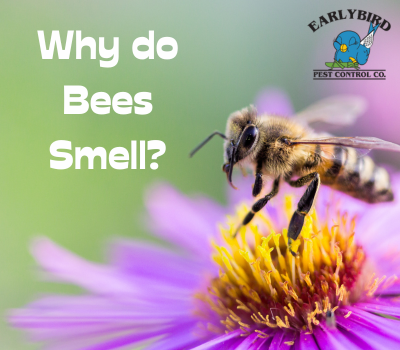Bees are remarkable creatures with a variety of sensory adaptations that aid in their survival and day-to-day activities. Among these sensory adaptations is their ability to perceive and emit scents. The question of why bees smell can be explored by delving into their biological and behavioral traits.
Understanding Why Bees Smell
Communication:
Bees primarily use pheromones, chemical signals, to communicate with each other. These pheromones are responsible for various functions within the hive, including signaling alarm, marking food sources, and regulating colony behavior.
For instance, when a worker bee locates a rich nectar source, it will return to the hive and release a scent or pheromone that informs other bees about the find. This scent guides other foragers to the source, facilitating efficient food collection.
Nest Identification:
Bees also use their sense of smell to identify their hive or nest. Each hive has a unique scent profile, created by the combination of pheromones from its resident bees. This scent allows bees to recognize and distinguish their own hive from other colonies.
Defense and Alarm:
Bees have alarm pheromones that they release when they sense a threat to the hive. These pheromones signal other bees to prepare for defense, potentially deterring predators or intruders.
Orientation and Navigation:
Scent trails left by foraging bees help them navigate to and from food sources efficiently. These scent trails are a valuable part of their communication and orientation system.
Environmental Sensing:
Bees are highly attuned to their environment, and their sense of smell allows them to detect changes in floral scents, weather conditions, and potential hazards like pesticides. This sensory awareness helps them make critical decisions about foraging and hive maintenance.
Food Quality Assessment:
Bees are selective about the nectar and pollen they collect. Their sense of smell aids in assessing the quality and nutritional value of flowers, guiding them to the most rewarding food sources.
Colony Health:
The overall scent profile of a colony can provide insights into its health. Bees can detect changes in the scent of their hive, indicating potential problems such as disease outbreaks or food shortages
Foraging Efficiency:
Bees are known for their incredible foraging abilities, and their sense of smell plays a pivotal role in this. When a bee encounters a flower with a rich source of nectar or pollen, it can quickly recognize and remember the scent profile of that flower. This memory allows bees to revisit the same type of flower, maximizing their foraging efficiency and energy conservation.
Pest Detection:
Bees are highly sensitive to changes in their environment, including the presence of pests and diseases. Their acute sense of smell enables them to detect invasive species, such as predatory wasps or parasitic mites, in their vicinity. This early warning system helps bees defend their colonies against potential threats.
Queen Pheromones:
Within a honeybee colony, the queen bee emits powerful pheromones that regulate the behavior and social structure of the hive. These pheromones influence worker bees to remain loyal to the queen, refrain from reproductive activities, and maintain a cooperative and organized colony.
The sense of smell in bees is a multifaceted and vital aspect of their biology and behavior. Through the release and perception of pheromones and environmental scents, bees navigate their surroundings, communicate with one another, protect their colonies, and ensure the overall health and success of their species. Understanding the significance of scent in the lives of bees sheds light on the remarkable adaptations of these essential pollinators and the intricate web of interactions that sustains them and our ecosystems.
More Tips on Pest Control:
-
- 4 Signs You Have Bed Bugs
- How to Get Rid of Cockroaches
- How to Get Rid of Rats
- How Do I Know if I Have a Scorpion Infestation?
- How Do I Know if I Have a Bee or Wasp Nest in My House?
- How Do You Know if You Have Mice or Rats?
- Do I Need a Professional to Remove Tarantulas?
- 5 Ways to Keep Pests out of the Office
- How Ants Ruin your Home
- Can Pests Destroy Stucco?
- Pros and Cons of a Stucco Home
- Does Arizona Have a Cockroach Problem?


Recent Comments